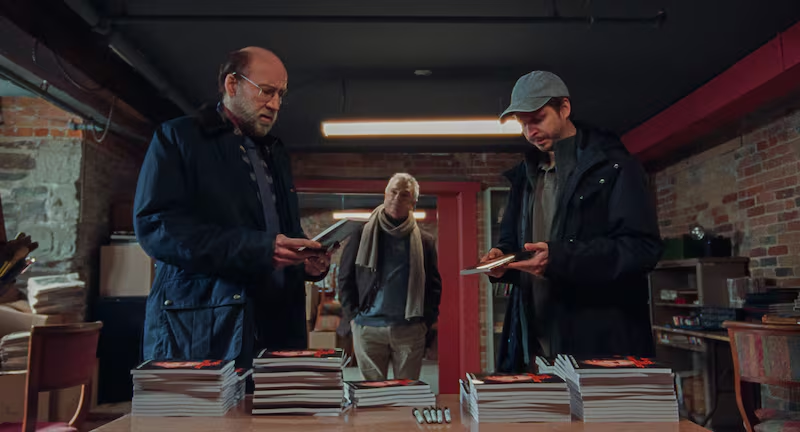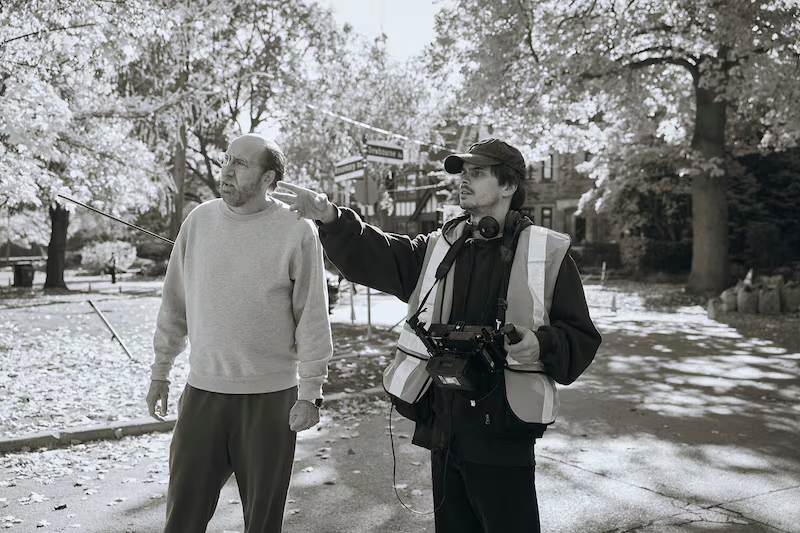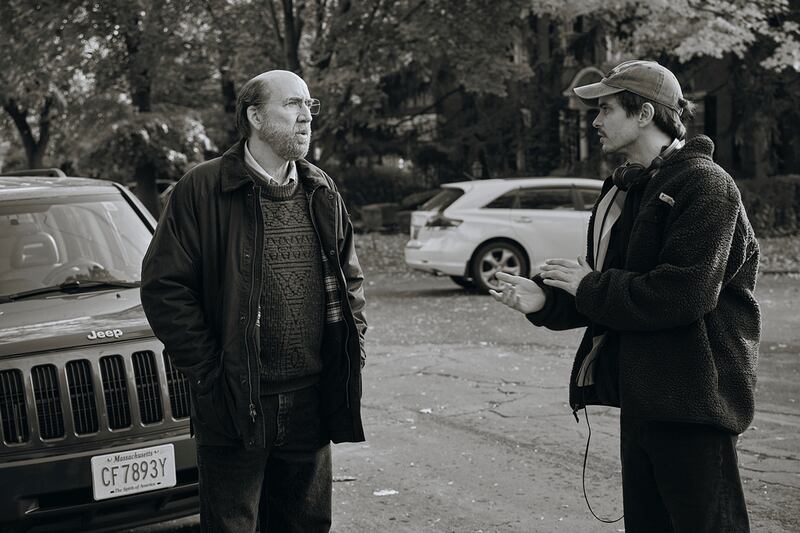It’s not often that a filmmaker has two movies drop in the same calendar year, and it’s even rarer that when they do, both movies are each of a piece with the other. Norway’s Kristoffer Borgli occupies that singular space; the L.A.-based director’s sophomore film Sick of Myself was released in April of this year by Utopia, and his most recent effort, Dream Scenario, is out in theaters now courtesy of A24.
The former is about the perils of attention-seeking, and the latter is about the suffering endured when people are subject to attention they never sought. If viewers look for the metaphor, Sick of Myself and Dream Scenario appear to represent opposite ends of the social media axis: What happens to those who strive to go viral, and what happens to those who go viral without meaning or wanting to. But neither Signe (Kristine Kujath Thorp), Sick of Myself’s antihero lead, nor Paul (Nicolas Cage), the starring schlemiel in Dream Scenario, allegorize social media notoriety at all. Instead, they’re reflections of Borgli’s own self-doubts and demons.
That his films can be—and indeed, frequently have been—interpreted as parables for the social media age says a great deal about how foundational social media is to our modern way of life. In Sick of Myself, Signe engages in a self-destructive (and one-sided) competition for attention and praise with her boyfriend, Thomas (Eirik Sæther), an artist on a hot streak, leading her to self-medicate with a pharmaceutical packing gruesome side effects; in Dream Scenario, Paul, a tenured professor at the fictional Osler University, suddenly and without explanation begins appearing in strangers’ dreams, kicking off his rise-and-fall from overnight sensation to eventual, and inevitable, global pariah.
Dream Scenario takes Cage’s recent ubiquity and turns it into a character study and a dark comic riot. But its relationship with, and distance from, Sick of Myself reveals a wealth of detail about Borgli’s fascinations as a filmmaker, where those fascinations are rooted, and maybe, ultimately, what movies are meant to be: essential for our lives, like all art; reflections of our social mores; and perhaps most of all, intellectually interactive.

A good film should require its audience to do at least a little heavy lifting. That folks have broadly taken Dream Scenario and Sick of Myself as social media commentary seems to prove that Borgli leads by example through his direction. With Sick of Myself available on Blu-ray via Vinegar Syndrome, and Dream Scenario expanding to wide release on Dec. 1, we spoke with Borgli over Zoom about the motifs connecting the pair as spiritual kin.
When I think of movies about people who become famous, usually they’re the ones who are chasing fame. It’s not every day that fame is something that’s imposed on a person. With Dream Scenario, was there intention on your part of subverting that fame narrative by making it about that?
No, I didn’t come to subvert a fame narrative. I think I came to subvert the horror genre, in a way, because it does feel like a high concept horror movie idea, not too dissimilar from A Nightmare on Elm Street. Both with Sick of Myself and Dream Scenario, I’m interested in taking a trope of one genre and placing it somewhere where it doesn't belong.
In Sick of Myself, it’s the visual aesthetic of body horror, and I took that out of the body horror genre and placed it in what I thought was more of a Woody Allen-esque movie. In Dream Scenario, I took that high-concept horror idea and placed it in a suburban dad’s life to see how that unfolds, and used that to look at the dynamics of our current culture too.
That’s the other thing. This is a duology about somebody seeking to get famous, and somebody who becomes famous. [Paul] isn’t famous because he does something online; he's famous for this other mysterious reason. Sick of Myself is about somebody trying to create their own viral fame. It seems like you’re telling stories about two different sides of how people become, if not famous, than certainly infamous on social media.
Well, it’s interesting that you say that because if you look at Sick of Myself, there are almost no screens in the movie. She never mentions having a social media presence. If she does, we don’t even know which one it is. She never mentions getting traction. It’s never a motivation for her explicitly. I think that the audience adds that element to it, probably because it seems rational for the Western world. But I never wrote it for that. I thought of taking a timeless idea of sympathy and validation as an extreme desire. [Signe], in the beginning of the film, she experiences a brutal dog attack, and she gets, by proxy, the experience of the attention from being the victim. That, in my head, is what triggers her journey more than social media.
I do think that movies should come with some assembly required. I don’t put all the pieces together before showing it. Here’s the pieces; you put it together. I think what happens in that process with some people is that they add the social media layer to it. For me, it was never about that, but it certainly is a natural part of modern life now, and it’s integrated with our brains and our identity. It’s a bigger cause for person and persona discrepancies. You create a brand for yourself, more than you would have before social media. I think that there’s a feedback loop into your life and your identity, and more of life is turned into a stage.

The fact that social media is never mentioned in Sick of Myself might come as a surprise to people who haven’t seen the film, given critics’ interpretations of its themes. Even people who have seen it might do a double-take.
I think that because I’m from Norway and I live in a welfare state, the issues that occupy me and the people around me are mostly existential and about self-actualization, about recognition, about validation. These two movies were written back to back, and they were both also written from the perspective of a 30-something-year-old director who felt like he hadn't made it yet, you know what I mean? There’s some of that feeding into it, and exorcising some demons, especially with Dream Scenario. What has become important to me is to start appreciating the process, and not hold my own happiness hostage to future, almost unattainable goals: getting into a big festival, getting the movie funded, all of these things where someone externally has to validate you.
In Dream Scenario, you see a person who’s in a midlife crisis because the image he has of himself as an important academic doesn’t match up with the world. The world doesn’t see him that way. It is driving him crazy, even though what he has looks objectively good. You see his family, you see his house, you see his university, all of these things look good. He’s not living in any desperate situation at all. [Paul] could be happy if he looked at it from a better angle. That’s definitely something that has been an issue with me, and Dream Scenario is a parable on what can happen if you are too hungry for external validation, or if your self-worth only through the eyes of others.
It’s interesting that [Dream Scenario and Sick of Myself] are a product of, instead of looking for external validation, you saying, “I’m gonna make these because I want to do it and it’ll make me happy.” You hinted at this before, but to me that says a lot about how you feel about the protagonists in these movies. Do you feel not just empathy for them, but sympathy because they can't find internal validation, and they go on these journeys for external validation that wind up punishing them?
Yeah. I keep feeling conflicted about these characters. I know their flaws, and I used some of my own flaws and exaggerated them to create them. So they’re not alien to me. The thought processes that they’re having, I’ve had them myself. I just have a little bit more self-awareness than these characters, I guess. But the reason I can write them is that they feel familiar to me. We all hold a bunch of inherent sort of contradictions, and we are flawed in many ways. I have bad, negative, dark sides of my psyche that I go to, and find comedy there or tragedy there. I find it interesting how we, in the American middle class or the Norwegian welfare system, can be very comfortable, but we find all these ways to make our lives miserable. I have a lot of anxiety around these issues, and I find comedy as a tool to diffuse the tension of that anxiety. So in a way, the comedy is a bit of a coping mechanism for that strangeness and complexity, and frustrating parts of being alive in this day and age.
To me, that makes the body horror of Sick of Myself and the elements of surrealist horror in Dream Scenario interesting complements to the comedy. They’re both deeply funny movies, but by the end of Sick of Myself, Signe looks like the monster you find hiding in your closet. She’s self-decayed. And Dream Scenario is full of all these mini horror movies, too. I’m curious if that was your thought as well—that horror was the best complement for the kind of comedy these movies reach for.
Yeah. I think more than anything, it’s following what I want to do in a movie. I selfishly want to do all of these things. I’ve also been very inspired and intrigued in my life when I’m meeting things that have a surprising mix of tone. One of them is Odd Nerdrum, a Norwegian painter. He’s a virtuoso of classical painting. He paints like Caravaggio. He’s extremely talented, and his persona in the world, how he presents himself, is extremely self-serious. One of his paintings is a self-portrait, a beautiful self-portrait, in oil paint, and in the painting he lifts his clothing and reveals that he has a boner, but with a very serious face. And he has other paintings of a woman shitting in the woods, and another one with three women on a rock shitting, but they’re beautifully painted and with such careful detail. It takes years to master the craft, and then [Nerdrum] uses that for these banal comedic depictions, but with seriousness. There’s a tone collision: I have to take the painting seriously, because this man has devoted his life to painting in the style, and he has, to me, an expert sense of humor that is above everyone, or he doesn’t even see it himself. I’m actually confused.
It’s sort of like the movie Spoorloos, The Vanishing, the Dutch movie, which is at times funny. You see the serial killer trying to abduct a woman and he fumbles in almost a slapstick way. The tone in that movie is so strange. It doesn’t acknowledge how fucked up it is, which makes me, the audience, frustrated with it, because I have to acknowledge how fucked up it is because the film isn’t doing it for me. That type of genre confusion is a place I’m very fascinated with. I am naturally curious about it, and want to go there.
That brings me back to what you said earlier about how movies should have some assembly required. I think it’s important for movies not to be didactic and tell you what they’re about—the text is the subtext, and vice versa. It feels to me like you confront that dynamic in yourself, and these movies are almost constructed to go against the idea that movies should give audiences everything that they need or everything they want. These movies require the audience to fill in gaps. Do you feel like that’s something movies, in a broader sense, are missing today—that willingness to trust in the audience and not hold their hand?
I mean, that’s gonna be a generalization, to say that movies are a certain way now. I think movies are great now and movies are bad now, like they’ve maybe always been. If you only count the good movies, I would say no. What I’m noticing though, is a cinema economy that is struggling a little bit to find its way back to where it was pre-pandemic. I think there’s more fear-based decisions, like you’re making sure you’re not making the wrong decision versus following the love and artistic integrity. That’s a problem with leaving cinema completely to market decisions. There’s all of these ways that movies can reach something really great and fantastic and new, but they have to take risks to get there. When the market is too scared of risks, we’re losing out.

I think there’s a lot of frustration about that from critics, and from audiences to a lesser extent. Those frustrations must be heightened on the filmmaker's side.
I think that's the difference between the European funding model, where it’s subsidized by governments and there isn’t pressure to make its money back. It’s OK if a certain percentage of those movies don’t make money at all. What’s good about that is that we, as filmmakers, can experiment more and take bigger risks. In a way, movies and art are seen as a public good that, much like libraries or parks, is vital to the human experience. That’s what’s scary about movies as a business in America, that we can suddenly just lose out. We have sort of done a bit of that; when all the money goes to superhero movies, Marvel movies, we’re really missing out on something important. It’s, I feel, the responsibility of companies like A24 to inject healthy nutrition into that space. I felt really lucky working with them, because it did feel like making a movie in Europe, where there was no big pressure to change the art itself to make it more viable as a product.
So I don’t know exactly. I don’t have the bird’s-eye perspective on movies right now. I think that's more like your job.
Yes, it is. That’s true.
But that’s my feeling, that there’s hope and there’s a new energy. Now, I feel like when I go to the movies, I go to sold out shows with a lot of energy in the room, and it’s feeling a little bit to me like movies are back, finally. I know that the industry is still trying to find its footing. I just want to encourage love-based decisions over fear-based decisions.






